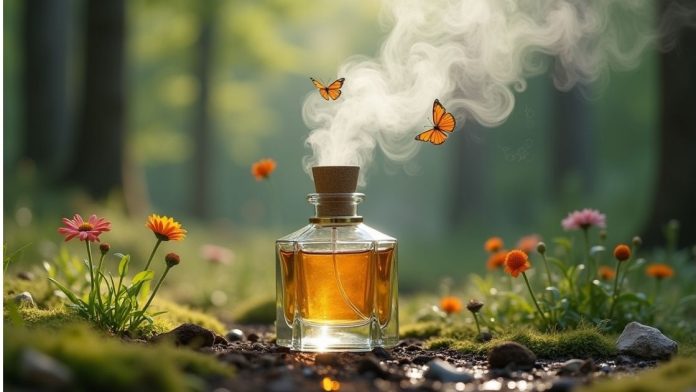You walk into a store, and the first thing that hits you is that crisp, clean “just-cleaned” scent. Or maybe you love the way your fabric softener makes your clothes smell like a spring meadow. But here’s the unsettling truth—those artificial fragrances don’t just disappear after you enjoy them.
Synthetic fragrances are everywhere—in perfumes, detergents, air fresheners, and even household cleaners. While they make life smell sweeter, they leave a bitter mark on the environment. From contaminating waterways to disrupting wildlife, these man-made scents have a dark side.
So, let’s pull back the curtain on synthetic fragrances and explore how they impact ecosystems—and what we can do to make better, greener choices.
How Synthetic Fragrances Harm the Environment
1. Chemical Runoff: Polluting Our Waterways
When you wash clothes scented with synthetic fragrances or rinse off perfumed body wash, those chemicals don’t just vanish. They flow into:
- Sewage systems → Many wastewater plants can’t fully filter out fragrance chemicals.
- Rivers and oceans → Synthetic musks (like galaxolide) accumulate in fish and disrupt aquatic life.
- Drinking water → Traces of fragrance chemicals have been found in tap water.
The scary part? Some of these compounds are persistent organic pollutants (POPs), meaning they don’t break down easily and linger for years.
2. Air Pollution: More Than Just a Pleasant Scent
Synthetic fragrances release volatile organic compounds (VOCs) into the air, which:
- Contribute to indoor air pollution (yes, your home air could be worse than outside!).
- React with sunlight to form ground-level ozone, a key component of smog.
3. Wildlife Disruption: When Scents Confuse Nature
- Bees & pollinators rely on natural floral scents to find flowers. Synthetic fragrances can mask these cues, throwing off their navigation.
- Aquatic life exposed to synthetic musks show hormonal disruptions, affecting reproduction.
The Most Harmful Chemicals in Synthetic Fragrances
Not all fragrance ingredients are created equal. Here are the worst offenders:
| Chemical | Common Use | Environmental Impact |
|---|---|---|
| Phthalates | Makes scents last longer | Endocrine disruptor; accumulates in fish |
| Synthetic Musks | Adds “clean” scent to detergents | Toxic to aquatic life; found in dolphin fat |
| Limonene | Citrusy fragrances | Reacts with air to form formaldehyde |
| Benzaldehyde | Almond-like scent | Toxic to algae and small aquatic organisms |
How to Reduce Your Fragrance Footprint
1. Choose Fragrance-Free or Naturally Scented Products
- Look for “fragrance-free” (not “unscented,” which may contain masking chemicals).
- Opt for essential oil-based products (but ensure they’re sustainably sourced).
2. Ditch the Air Fresheners
- Instead of plug-ins or sprays, try:
- Beeswax candles (clean-burning, natural scent).
- Houseplants (like lavender or eucalyptus) that purify air.
- DIY room sprays (water + essential oils).
3. Wash Smarter
- Use fragrance-free detergents (or ones with biodegradable scents).
- Skip fabric softener—wool dryer balls soften clothes naturally.
4. Support Eco-Conscious Brands
- Perfume: Brands like Heretic (100% natural) or Clean Reserve (eco-friendly synthetics).
- Home products: Branch Basics, Ecover, or Blueland (plastic-free, fragrance-free).
FAQs: Synthetic Fragrances & the Planet
1. Are “unscented” and “fragrance-free” the same?
No! “Unscented” often means chemicals are added to mask odors, while “fragrance-free” means no added scents.
2. Do natural fragrances break down faster?
Yes! Essential oils decompose more easily than synthetic musks, which can persist for decades.
3. Can synthetic fragrances affect human health too?
Absolutely. Some chemicals (like phthalates) are linked to hormone disruption and allergies.
4. What’s the most eco-friendly way to wear perfume?
Solid perfumes or alcohol-free oil-based scents have lower VOC emissions.
5. How can I tell if a product has harmful synthetics?
Check labels for:
- “Parfum” or “fragrance” (a catch-all term for hidden chemicals).
- Phthalates, musks, or benzaldehyde in the ingredients list.
Conclusion
We don’t have to give up smelling great to protect the planet. By choosing cleaner products, reducing synthetic fragrance use, and supporting sustainable brands, we can enjoy beautiful scents without the ecological guilt.
Your Turn: Have you switched to a natural fragrance or found a great eco-friendly alternative? Share your favorite tips (or struggles!) in the comments—let’s learn from each other!**
If this opened your eyes, share it with someone who loves fresh scents. Together, we can make a difference! 🌍💚

